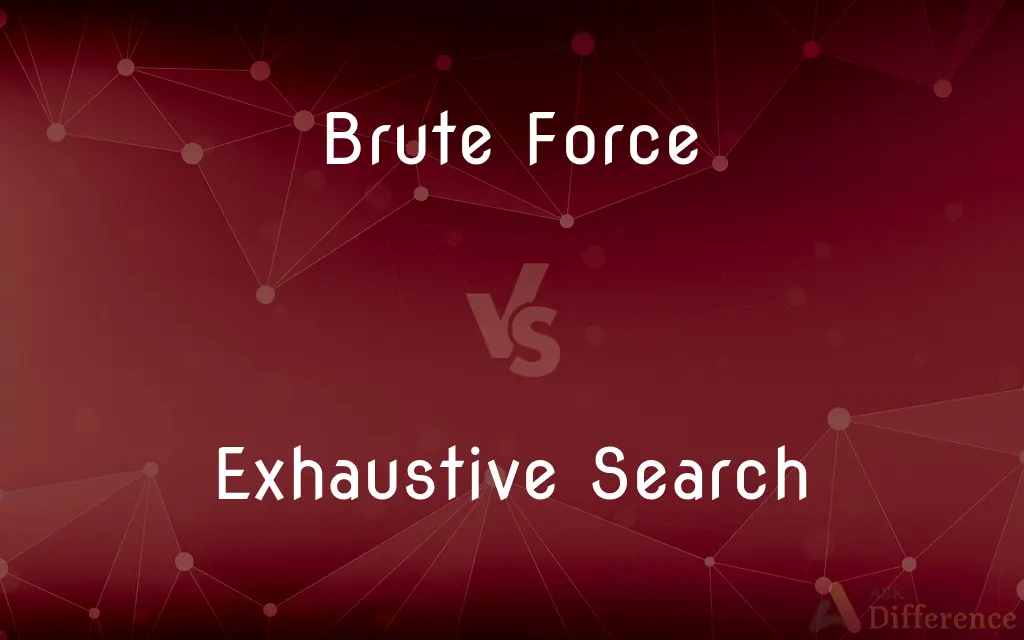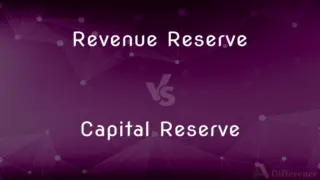Brute Force vs. Exhaustive Search — What's the Difference?
By Tayyaba Rehman — Published on October 8, 2023
Brute Force involves trying every possible solution until one works, while Exhaustive Search is a systematic method of checking all possibilities.

Difference Between Brute Force and Exhaustive Search
Table of Contents
ADVERTISEMENT
Key Differences
Brute Force and Exhaustive Search are both techniques that involve exploring all possible solutions to a problem. However, their approach and application differ. Brute Force typically refers to a trial-and-error method without any particular order or strategy. It's like attempting every combination on a lock without a specific sequence in mind. On the other hand, Exhaustive Search is more methodical, ensuring every possibility is explored systematically.
In computer algorithms, Brute Force may sometimes seem haphazard. It can mean trying all possible inputs to see which one produces the desired outcome. Conversely, an Exhaustive Search in this context is more structured. It might involve a recursive algorithm that systematically checks each possible solution in a defined sequence. Though both can be time-consuming, Brute Force may not guarantee a solution is found if the process is halted prematurely, while an Exhaustive Search is designed to comb through every possible option.
In cryptographic contexts, Brute Force might involve trying every potential password combination to decrypt information. The process doesn't prioritize one combination over another; it's purely trial and error. An Exhaustive Search in cryptography, while similar, would ensure that every possible combination is tried in a specific order, ensuring no option is overlooked.
Finally, it's essential to understand that while all Exhaustive Searches are inherently a form of Brute Force, not all Brute Force efforts are Exhaustive Searches. Brute Force is a broader concept, encompassing any attempt to find a solution through sheer effort without a guiding strategy, while Exhaustive Search is a subtype, ensuring every possible solution is examined.
Comparison Chart
Methodology
Trial and error without specific order
Systematically checks all possibilities
ADVERTISEMENT
Application
Trying all possible inputs randomly
Checks every possible solution in a defined sequence
Assurance of Solution
May not guarantee a solution
Ensures all options are explored
Use in Cryptography
Trying every password combination
Ensures every password combination is tried in order
Broader Context
Any attempt without a guiding strategy
A subtype of Brute Force, more systematic
Compare with Definitions
Brute Force
Brute Force can be inefficient.
Using Brute Force to solve the puzzle took longer than expected.
Exhaustive Search
Exhaustive Search guarantees no option is overlooked.
The scientist ensured an Exhaustive Search of all data sets for accuracy.
Brute Force
Brute Force involves sheer effort.
They used Brute Force to try every possible setting on the machine.
Exhaustive Search
Exhaustive Search is systematic.
Through an Exhaustive Search, the software tested each algorithm variation.
Brute Force
Brute Force doesn't follow a specific order.
The hacker's Brute Force attack didn't prioritize any specific sequence.
Exhaustive Search
Exhaustive Search explores all possibilities.
The program used an Exhaustive Search to find the best route.
Brute Force
Brute Force may not guarantee results.
Despite his Brute Force attempt, he couldn't open the safe.
Exhaustive Search
Exhaustive Search is a subtype of Brute Force.
While the Brute Force method was broad, the Exhaustive Search was more precise.
Brute Force
Brute Force is a trial-and-error method.
He used Brute Force to guess the password by trying various combinations.
Exhaustive Search
Exhaustive Search checks in a defined sequence.
The Exhaustive Search algorithm processed each input from smallest to largest.
Brute Force
Alternative spelling of brute force
Common Curiosities
Is Brute Force random?
Brute Force doesn't follow a specific order, making it seem random, but it's more about trial and error.
Can Brute Force be used in cryptography?
Yes, Brute Force can involve trying every password combination to decrypt information.
Does Exhaustive Search guarantee a solution?
Exhaustive Search guarantees that all possibilities are checked, but the solution might not exist in the given set.
Can an Exhaustive Search be halted midway?
Yes, but halting it prematurely means not all possibilities have been explored.
Which is more efficient, Brute Force or Exhaustive Search?
Both can be inefficient, but Exhaustive Search is systematic and ensures all options are explored.
Is Exhaustive Search always the best method to find a solution?
Not always. While it's thorough, it might not be efficient for all problems.
Which method is faster, Brute Force or Exhaustive Search?
Speed varies based on context, but both methods can be time-consuming.
Are Brute Force and Exhaustive Search the same?
No, while all Exhaustive Searches are Brute Force, not all Brute Force methods are Exhaustive Searches.
Why use Brute Force if it's inefficient?
Sometimes it's the only known approach, especially if no pattern or strategy is evident.
Share Your Discovery

Previous Comparison
Would Have vs. Could Have
Next Comparison
Revenue Reserve vs. Capital ReserveAuthor Spotlight
Written by
Tayyaba RehmanTayyaba Rehman is a distinguished writer, currently serving as a primary contributor to askdifference.com. As a researcher in semantics and etymology, Tayyaba's passion for the complexity of languages and their distinctions has found a perfect home on the platform. Tayyaba delves into the intricacies of language, distinguishing between commonly confused words and phrases, thereby providing clarity for readers worldwide.
















































